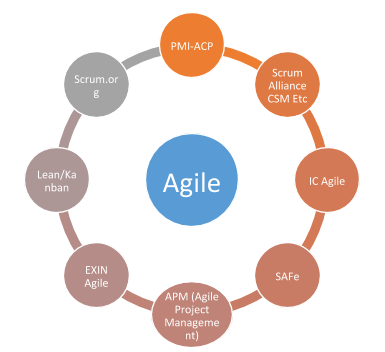
- Introduction to Project Management Certifications
- Importance of Certification
- PMP (Project Management Professional)
- CAPM (Certified Associate in Project Management)
- PRINCE2 Certification
- Certified Scrum Master (CSM)
- Six Sigma Certifications
- Selecting the Proper Certification
- Conclusion
Introduction to Project Management Certification
Project management certifications serve as formal validation of an individual’s comprehensive knowledge, practical skills, and demonstrated ability to successfully lead and manage projects of varying complexity. These certifications provide tangible proof that a person is equipped to professionally plan, execute, monitor, and deliver projects within scope, time, and budget constraints, while also managing risks, resources, and stakeholders effectively. Recognized and highly valued by employers across industries worldwide, such credentials signal a strong commitment to excellence, professional growth, and adherence to industry best practices. In today’s increasingly competitive and fast-paced job market, possessing a reputable and up-to-date project management certification, along with relevant Data Science Training, not only enhances professional credibility but also significantly expands career prospects and increases earning potential. With a wide range of certifications available such as PMP, PRINCE2, CAPM, and Certified Scrum Master individuals can strategically select the most suitable credential based on their career goals, industry demands, preferred methodologies, and current level of experience. Making an informed choice ensures alignment with long-term aspirations and provides a solid foundation for advancement in the dynamic field of project management.
Eager to Acquire Your Data Science Certification? View The Data Science Course Offered By ACTE Right Now!
Importance of Certification
- There are several reasons why project management certification is important. For starters, they establish a professional image by validating experience and competence in industry-approved methodologies.
- Employers will assign more complex and challenging tasks to certified project managers because they can be relied upon. Second, certifications promote career prospects by making job applicants more attractive to employers.
- Most organizations mandate or recommend certified project managers, especially for managerial roles. In addition, credentials equate to higher income due to the fact that credentialed workers tend to be paid more than non-credentialed workers.
- Last but not least, credentials reflect compliance with continuing study and professional development, which is highly desired in the quickly changing project management industry.
PMP (Project Management Professional)
Project Management Professional (PMP), certified by the Project Management Institute (PMI), is one of the most well-known and respected globally. It is given to seasoned project managers who work with massive and complicated projects. The PMP certification covers broad areas such as initiating, planning, executing, monitoring, and closing the project. Qualification requires candidates to have either a four-year degree and 36 months of experience in project management or a secondary diploma and 60 months of experience with 35 hours of education in project management—the PMP Certification suits mid to senior-level project managers interested in leadership positions.

CAPM (Certified Associate in Project Management)
- PMI also provides the Certified Associate in Project Management (CAPM) credential, an initial-level credential for candidates with low project management exposure.
- This certification offers basic concepts of project management, principles, processes, and frameworks and is suitable for newcomers.
- Candidates must possess a high school diploma or worldwide equivalent and 23 hours of project management training.
- CAPM certification is ideal for entry-level project managers, graduates, or emerging project professionals who desire to enhance their core competencies.
PRINCE2 Certification
PRINCE2 certification is recognized all over Europe and the UK. PRINCE2 is based on a formal, systematic approach to project management that can be adopted for any project size or complexity. PRINCE2 is available in two levels: Foundation, where basic concepts, themes, and processes are discussed, and Practitioner, which is concerned about adopting PRINCE2 principles in real projects. There are no official qualifications for the Foundation level, but candidates would require the Foundation certificate in order to take the Practitioner exam. Prince2 – Project Management is used extensively in government, IT, and construction industries, so it is a perfect choice for those in these areas of work.
Excited to Obtaining Your Data Science Certificate? View The Data Science Training Offered By ACTE Right Now!
Certified ScrumMaster (CSM)
- The Certified ScrumMaster (CSM) certification, provided by the Scrum Alliance, is intended for professionals who work in Agile and Scrum environments.
- It certifies the candidate in the Scrum process and Agile project management techniques such as sprint planning, implementation, and teamwork.
- Candidates must undergo a two-day certified Scrum trainer course and pass the CSM test to obtain the Certified Scrum Master.
- This certification is appropriate for project managers, product owners, Scrum Masters, and Agile team members.
Interested in Pursuing Data Science Master’s Program? Enroll For Data Science Master Course Today!
Agile Certified Practitioner (PMI-ACP)
The PMI Agile Certified Practitioner (PMI-ACP), also presented by PMI, is for people working in Agile projects. It certifies knowledge in Agile methodologies, tools, and principles like Lean, Kanban, and Scrum practices. To be eligible, applicants must have 2,000 hours of general project experience, 1,500 hours of experience working on Agile teams, and 21 hours of Agile project management training. “The PMI-ACP certification best suits Agile project managers, team leads, consultants, and professionals involved in Data science Training who want to apply Agile practices in their projects.

Six Sigma Certifications
Six Sigma certifications center on process improvement, quality control, and defect reduction. These certifications are divided into various levels: Yellow Belt for starters, Green Belt for professionals working on process improvement projects, and Black Belt for experts working on large-scale projects. Six Sigma methodologies like DMAIC (Define, Measure, Analyze, Improve, and Control) assist organizations in improving efficiency and providing high-quality outputs. These certifications are helpful in manufacturing, healthcare, finance, and IT sectors, so they are incredibly versatile.
Preparing for a Data Science Job Interview? Check Out Our Blog on Data Science Interview Questions & Answer
Selecting the Proper Certification
- The best project management certification to pick is according to your job objectives, expertise, and company requirements.
- PMP is ideal for professional project managers, while future or beginning managers should start with the CAPM Certification.
- For those professionals engaged with agile projects, it would be apt to pursue CSM or PMI-ACP, or the one in structured approaches being sought, they should go in for PRINCE2.
- Individuals interested in process improvement can derive value from Six Sigma certifications.
- It is crucial to evaluate the industry acceptance of the certification, its applicability to your industry, and the possible impact on your career before making a decision.
Conclusion
Project management certifications are highly respected, quality credentials that not only validate a professional’s skills and knowledge but also demonstrate a strong commitment to career development and continuous learning. These certifications play a crucial role in confirming one’s ability to effectively plan, execute, and lead projects across a wide range of industries. They significantly enhance career opportunities by making candidates more competitive in the job market, much like Data Science Training, and they often lead to higher earning potential and faster career progression. Whether you are an experienced project manager aiming to formalize your expertise or an aspiring professional looking to enter the project management field, obtaining a relevant certification can serve as a powerful stepping stone toward achieving your professional goals. By carefully selecting the right certification that aligns with your career aspirations, industry preferences, and level of experience, you not only build a solid foundation of project management competencies but also establish yourself as a credible, trusted, and capable leader in an increasingly demanding and dynamic global job market.


